Eric Adams Says New York City's Density Justifies Subway Mask Mandate
"We should still have masks on the subway system. New York is unique. We are densely populated," said the mayor at a press conference today.

The masks are coming off travelers everywhere following a Monday ruling from a federal district court judge in Florida voiding the Biden administration's requirement that riders on planes, trains, buses, and rideshare vehicles cover their faces.
The crew on one JetBlue flight reportedly announced an end to the mandate inflight. Most other airlines, from American to United, dropped the requirement in a less dramatic fashion. The Transportation Security Administration said it wouldn't enforce the rule anymore either in light of the ruling.
Travelers within America's largest city won't be breathing any easier, however. The state's Metropolitan Transportation Authority (MTA)—which runs bus and train service in the wider New York City area—has said that its mask mandate will remain firmly in place. New York City's Taxi and Limousine Commission has said riders of cabs, Ubers, and Lyfts will still have to mask up, reports The New York Times.
All of this has been met with approval from the city's mayor, Eric Adams, who said today that continued masking was necessary given an uptick in cases and New York City's unique levels of urban density.
"We should still have masks on the subway system. New York is unique. We are densely populated," said Adams at a press conference today.
NYC Mayor Eric Adams (D) following a Florida judge's ruling overturning the national transportation mask mandate:
"We should still have masks on the subway system. New York is unique. We are densely populated." pic.twitter.com/8wFtHzlbtE
— The Recount (@therecount) April 19, 2022
The idea that dense New York City was particularly vulnerable to COVID-19 was an early, oft-repeated idea at the onset of the pandemic when the Big Apple was slammed with the nation's first major outbreak.
Then-Gov. Andrew Cuomo (D) tweeted in March 2020 that "there is a density level in NYC that is destructive. It has to stop and it has to stop now. NYC must develop an immediate plan to reduce density." The Los Angeles Times ran a smug op-ed touting the prophylactic benefits of the city's sprawl a few weeks later.
This idea wasn't totally unreasonable, but it didn't quite fit the facts of the early pandemic. Lower-density suburbs of New York City like Nassau and Westchester County were the first to experience serious outbreaks. Manhattan, by contrast, weathered the early pandemic slightly better.
Nolan Gray, sifting through the evidence in City Journal a year later, found remarkably little support for the idea that density—that is, more people living within a given square mile—was the problem. By contrast, there's been ample evidence that housing overcrowding—more people living within the same housing unit—did aid the spread of COVID-19.
It was a similar story with the New York subway system in particular. One early study from April 2020 claimed that outbreaks were concentrated along subway lines and that case growth slowed most quickly in areas where transit ridership also fell quickest.
But closer parsing of the data again revealed almost no connection between actual levels of transit ridership and COVID-19 infections.
As the pandemic wore on, the appearance of serious COVID-19 outbreaks everywhere from sprawling Los Angeles to rural South Dakota provided more evidence still that density per se didn't make your city uniquely dangerous.
Citing New York's density as a reason to keep masking requirements on the subway around, as Adams did, seems particularly outdated. It's also kind of silly in light of the fact that every other environment in New York City doesn't require masks.
People don't ride the subway for the hell of it. They ride it to get somewhere, with that somewhere often being a maskless office, maskless bar, or maskless private residence. Requiring face coverings during one's brief time en route from one of those locations to another isn't adding much protection from infection.
These mandates are however a hassle for riders who have to comply with them and transit agencies themselves who have to enforce them. The American Public Transportation Association has been urging the Biden administration to drop its mask mandate for transportation for months now, citing the costs of enforcement.
In light of that, Adams' defense of mandatory masking on subways seems more reactionary than anything else.
Rent Free is a weekly newsletter from Christian Britschgi on urbanism and the fight for less regulation, more housing, more property rights, and more freedom in America's cities.


Show Comments (50)